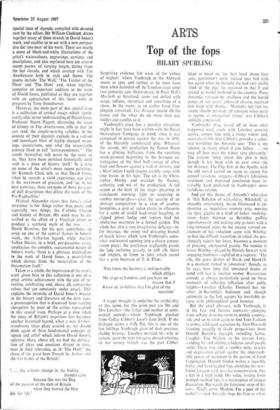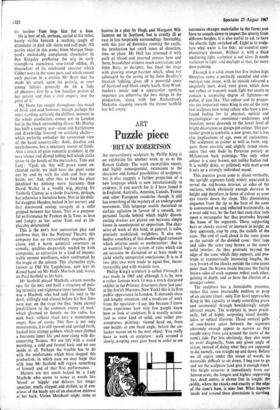Top of the fops ARTS
HILARY SPURLING
Surprising evidence last week of the virtues of neglect: where Vanbrugh at the Aldwych seems as spry and cutting as he must have been when hounded off the London stage some two centuries ago, Shakespeare, in Peter Hall's Macbeth at Stratford, turns out dulled with usage, tedious, rhetorical and something of a chore. In the event, as an earlier Lord Fop- pington remarked, The Relapse should fill the house and the other do no more than pay fiddles and candles to it.
Vanbrugh's piece has a peculiar attraction, might in fact have been written with the Royal Shakespeare Company in mind, since it was composed in protest against the rise, in 1696, of the blatantly commercial play. Whatever the reason, this production by Trevor Nunn has a glinting brilliance, from the ravishing mock-pastoral beginning to the baroque ex- travagance of the final ball--swags of silver fruit and flowers against a wall of mirrors, and a blast infant Cupid singing worldly songs with vine leaves in his hair. The set is by Chris- topher Morley and matches the fluency, authority and wit of the production. A tall screen at the back of the stage—gleaming in translucent morning light or reversing to sombre mirror-glass—gives the severity of an abstract composition to a knot of country bumpkins, a pair of sedan chairs in silhouette for a scene of sordid back-street haggling, or clipped privet hedge and topiary bird for adulterous overtures in a formal garden. The whole has also a rare imaginative delicacy—in, for instance, the swing and drooping branch of beech leaves which turn Vanbrugh's some- what sentimental opening into a chaste conver- sation piece: the gentleman negligently posed, the lady inclining gravely, in stiff silk shirts and ringlets, to listen to lines which sound like a grim foretaste of T. S. Eliot:
'You know the business is indispensable which obliges Me to go to London, and you have no
reason that I
Know of, to believe that I'm glad of the occasion.'
A happy thought to underline the artificiality of this scene, for this prim pair are Mr and Mrs Loveless—the father and mother of senti- mental comedy—whom Vanbrugh pinched from Colley Cibber's Love's Last Shift. If the dialogue seems a trifle flat, this is one of the few inklings Vanbrugh gives of their previous shabby history: Loveless married his wife at sixteen, spent the next ten years abroad whoring on her money (which v.as the part Cibber liked to boast of, for 'he's lewd above four acts, gentlemen') until, tricked into bed with
her again when he thought she had very civilly 'died of the pip,' he repented in Act 5 and retired as model husband to the country. Pious Amanda, ravaged by smallpox and the horrid pangs of ten years' enforced chasity, received him back with thanks: 'Methinks her fair ex- ample should persuade all constant wives ne'er to repine at unrequited virtue,' was Cibber's unlikely conclusion.
Vanbrugh's play, tossed off to show what happened next, starts with Loveless growing
restive, tempts him with a frisky widow and, more charitable than Cibber's, provides a seduc- tive worldling for Amanda too: 'This is my scheme, in short; which if you follow . . . we may all four pass the winter very pleasantly.' The curious thing about this plot is that, though it has been with us ever since—in, for instance, The Flip Side at the Apollo, with the old moral tacked on again as excuse for genteel salacious sniggers—Cibber's lubricious treatment and depraved conclusion have in- variably been preferred to Vanbrugh's more fastidious version.
And yet this theme, of Amanda's education in 'that Babylon of wickedness, Whitehall,' is absurdly entertaining. Susan Fleetwood is en- chanting as inquisitive country prig, moving via tipsy giggles in a kind of ladies' smoking- room—Janet Suzman as Berinthia puffing apprehensively and making airy gestures with a long-stemmed pipe--to the steamy sensual ex- citement of her seduction scene with Worthy; so that the difficult transition, in which she pas- sionately rejects her lover, becomes a moment of piercing, unexpected gravity. No wonder it leaves Worthy—played by Patrick Stewart with engaging fruitiness—uplifted in a rapture: 'The vile, the gross desires of fleash and blood/Is in a moment turned to adoration'; though, as he says, how long this unnatural frame of mind will last is another matter. Restoration comedy is always particularly good on these moments of sobering reflection after giddy heights—Loveless (Charles Thomas) has an- other in Berinthia's bedroom and, though optimistic to the last, accepts his inevitable re- lapse with philosophical good humour.
But the chief pleasure, with Vanbrugh, is in his fast and furious contrasts—plunging from urbane drawing-room to muddy country- side and up to town again to find Tom Fashion (a grimy, wild-eyed scarecrow by Alan Howard) listening greedily to shady propositions from Donald Burton's decrepit, swindling lecher, Coupler; Tim Wylton, as his servant Lory, standing by and smiling a hideous small purple ;mile. These two add a sombre note, avarice md deprivation pitted against the imperturb- able power of mammon in the person of Lord Foppington. Donald Sinden makes a superbly bulky and hard-headed fop, clutching his new- found languor with massive concentration, like a bat in a high wind. His voice, issuing from painted rosebud lips, is a masterpiece of rococo decoration. But watch the ferocious snap of his jaws—'Gad's curse, Madam, I'm a peer of the realm!'—%Nhen Amanda slaps his face or %Oen
his brother Tom begs him for a loan.
He is best of all, perhaps, seated at his toilet, barely visible beneath a seething tangle of attendants in pink silk shirts and calf-pads. All parties excel in this scene, from Morgan Shep- pard's unshakably complacent shoemaker to Ben Kingsley proffering the wig in surly triumph—a monstrous rose-tinted edifice, fit descendant of its celebrated ancestor which Cibber wore in the same part, and which roused such passion in a certain Mr Brett that 'he made his attack upon the periwig, as your young fellows generally do on a lady of pleasure; first by a few familiar praises of her person and then a civil enquiry into the price of it.'
Mr Nunn has caught throughout this mood of brisk and acid humour; though perhaps the most startling, certainly the chilliest, moment in the whole production, comes not in London but in the bleak surrounding desert. Mr Morley has built a country seat—stout oak battlements and drawbridge lowered on creaking chains— which perfectly embodies the restoration view of the hated countryside: dank, desolate and unwholesome, but a necessary source of funds. Also a streak of grim romantic grandeur, in the eery silence and dismal tolling bell which strike terror to the hearts of the marauders, Tom and Lory: Tgad, sir, this will prove some en- chanted castle; we shall have the giant come out by and by with his club and beat our brains out.' Sad, after this, to find the place inhabited by nothing more fearsome than David Waller in a woolly wig, playing Sir Tunbelly Clumsy as a shade fractious, perhaps, but otherwise a harmless bore. Not so his dole- Tul daughter Hoyden, locked in her nursery and first discovered sawing savagely at a cello gripped between her knees. This is a purpose- ful performance by Frances de Is Tour, as lean and hungry as her suitor Tom and as im- placably determined.
This is the agr's first restoration play and confirms that, like the National Theatre, this company has an extraordinary elegance, pre- cision and a harsh quizzical sweetness in comedy; qualities desperately needed by both companies, as corrective to a kind of impene- trable earnest woolliness, when confronted by the tragic or the solemn. This alternative style, known as Old Vic Lugubrious, now lays its dismal hand on Mr Hall's Macbeth and, worse, on Paul Scofield as his hero.
Mr Scofield played Macbeth sixteen months ago, for the BBC, and built a structure of puls- ing intensity and nightmare inner tensions. That was a Macbeth who had sold his soul to the devil, willingly and almost before his first lines were out; on the stage the line, 'mine eternal jewel/Given to the common enemy of man,' which gleamed so fiercely on the radio, has sunk back without trace into a monotonous empty flow of words. This flow is not only monotonous, it is still spewed and spurted forth, hacked into strange gobbets which once clothed a fearsome inner life and now clang with dis- concerting flatness. We are left with a weird mouthing, a cold and formal husk and no one inside at all. Perhaps the trouble has to do with the misfortunes which have dogged this production, in which case we may hope that with time Mr Scofield will regain something of himself and of that first performance.
Matters are not much helped by a Lady Macbeth who seems to wince at words like 'blood' or 'nipple' and delivers her longer speeches, neatly clipped and drilled, as if con- scious of the beady eye of an elocution mistress at her back. Vivien Merchant might shine as hostess in a play by Hugh and Margaret Wil- liamson set in Scotland, but is cruelly ill at ease in less hospitable surroundings. Inevitably, with this pair of dummies running the castle, the production has small sense of direction, time or place. Mr Hall has trimmed it with pails of blood and inserted crosses here and there, brandished without much conviction; and John Bury, as designer, has lined the stage with glowing orange heather which, when not sabotaged by the acting or by John Bradley's freakish lighting, gives off a powerful sense of Scotland and bleak empty heath. Guy Wool- fenden's music and a spectacular opening sequence are otherwise the best things in the production, along with Ian Richardson's Malcolm stepping towards the throne Scofield has left empty.































 Previous page
Previous page